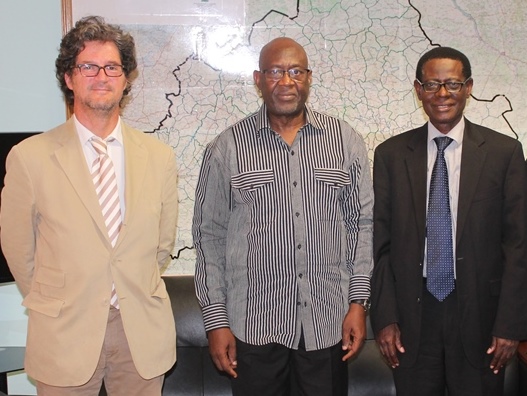A delegation from the GFAR Secretariat was received last week by the Minister of Agriculture and Water Management of Burkina Faso, the Honorable Jacob Ouedraogo, to discuss developing collective actions to solve problems in agriculture at scale in the country. The delegation, led by Prof. Wale Adekunle, GFAR Senior Adviser on Knowledge, Innovation and Enterprise, presented GFAR's unique approach to working with countries, taking high-level challenges, and using innovation platforms to solve them. GFAR Secretariat's Alessandro Meschinelli also attended to bring perspectives on Farmers' Empowerment.
From left to right: Alessandro Meschinelli, GFAR; the Honorable Minister Jacob Ouedraogo; and Prof. Wale Adekunle, GFAR
Burkina Faso is a low-income country, where agriculture contributed about 30 percent of GDP in 2012, employing more than 90 percent of the labor force. The country maintains good economic growth based mainly on extractive industries. However, despite a decade of sustained growth, poverty persists, especially in rural areas. GDP per capita remains one of the lowest in the world; according to the UNDP Human Development Index, in 2012 the country ranked 183rd out of 186 countries. Food insecurity and malnutrition rates are chronically high. The number of undernourished people increased from 3.8 million in 2008-10 to 4.4 million in 2011-13, which corresponds to almost a quarter of the total population.
GFAR offers an approach that triggers the development of collective actions addressing these challenges at the root. The approach takes into consideration a wide range of stakeholders, mobilizing multiple donors around supporting collective actions. The process begins with conducting national studies that will focus on determining a desirable future for the country in a timely manner and channels to the desired future. This study will be complemented by other studies to capture existing capacity and the gap between what exists and what is needed to deliver the desired future. The programs to be developed must not only increase productivity and access to markets, but also be sensitive to gender, youth and climate smart practices.
This approach makes use of an innovation platform. The activities of the innovation platform involve planning, implementation, monitoring and evaluation, and learning lessons in an iterative way to continually improve achievements and impacts.The approach combines the use of new methods such as prospective studies with the best of old approaches to provide impact at scale.
The expected outcomes of these interventions are the following benefits to the population of Burkina Faso:
1. Meeting food self-sufficiency in the commodity of choice
2. Bridging hunger and the malnutrition gap
3. Reducing poverty and populating the middle class in Burkina Faso to trigger the foreign direct investment needed for economic development
4. Providing job opportunities to young people in their thousands
5. Consolidation of the Foundation for Economic Development.
It is hoped that with this approach, Burkina Faso will become a significant player in the sub-regional agricultural market, and, one day, also in the global market. The GFAR delegation urged Minister Ouedraogo to use his office to engage other ministries, including higher education, women's affairs, finance, youth affairs, economic planning, environment, trade, and others to work together to develop a holististic strategy, as collaboration and stakeholder participation are crucial to the success of this endeavor.
Read more about the meeting on the Facebook page of the Minister of Agriculture and Hydraulics of Burkina Faso here.

